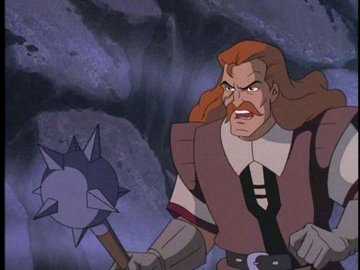Difference between revisions of "Macduff"
Supermorff (talk | contribs) (title format. +link. reword intro) |
|||
| Line 5: | Line 5: | ||
==History== | ==History== | ||
He fought for Duncan against [[Macbeth]] in [[1040]], and tried to stab Macbeth in the back while Duncan attacked him in the front, only to be incapacitated by [[Demona]]. | He fought for Duncan against [[Macbeth]] in [[1040]], and tried to stab Macbeth in the back while Duncan attacked him in the front, only to be incapacitated by [[Demona]]. | ||
| + | |||
| + | ==Appearances== | ||
| + | * "[[City of Stone Part Three]]" (First Appearance, Probable Death of Character) | ||
==Real World History== | ==Real World History== | ||
Revision as of 11:19, 31 December 2007
Macduff was Duncan's retainer.
History
He fought for Duncan against Macbeth in 1040, and tried to stab Macbeth in the back while Duncan attacked him in the front, only to be incapacitated by Demona.
Appearances
- "City of Stone Part Three" (First Appearance, Probable Death of Character)
Real World History
Macduff is presumably the Gargoyles equivalent of the Macduff of Shakespeare's Macbeth, although obviously not quite identical to him. The Shakespearean Macduff, Thane of Fife, slays Macbeth in Shakespeare's play, being the only one able to do so since he was not "of woman born", but "from his mother's womb untimely ripped", via Caesarian section. This does indeed parallel the Macbeth of Gargoyles, who can similarly only be slain by one who was not born of woman - namely Demona, who was hatched from a gargoyle egg.
Production Background
Voice Actor: Charles Hallahan
